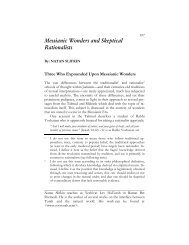Is There a Disconnect between Torah Learning and ... - Hakirah.org
Is There a Disconnect between Torah Learning and ... - Hakirah.org
Is There a Disconnect between Torah Learning and ... - Hakirah.org
Create successful ePaper yourself
Turn your PDF publications into a flip-book with our unique Google optimized e-Paper software.
14 : Hạkirah, the Flatbush Journal of Jewish Law <strong>and</strong> Thought<br />
<strong>and</strong> less cruel to each other?” 5 Additionally, if it is unfortunately true,<br />
should we not be asking ourselves why?<br />
At workshops that I give to teachers on Behavior Management in<br />
the Classroom, I hear teachers <strong>and</strong> rabbeyim complaining incessantly<br />
about the level of chutzpa (arrogance) they meet up with, <strong>and</strong> their<br />
feelings of helplessness in controlling it.<br />
In one sixth-grade classroom a teacher asked one of her students to<br />
pick a sheet of paper up from the floor. The student’s response? “I<br />
don’t work here, you do!” What’s worse is that the teacher had no<br />
response to this. She was so flabbergasted by the student’s chutzpa<br />
that she was at a loss regarding what to do.<br />
In individual sessions with parents <strong>and</strong> their children, I hear<br />
children speak to their parents in ways I could not have imagined<br />
possible. The parents report that what goes on at home is even<br />
worse. Like the teachers, the parents accept this with resignation,<br />
chalking it up to 6<br />
, the prediction in the<br />
Mishnah that in the end of days before Mashiach arrives we should<br />
expect an increase in chutzpah. Some are actually afraid to say<br />
anything, frightened as they are by all the talk of children becoming<br />
“at risk” <strong>and</strong> going “off the derech” because their parents were “too<br />
strict.” They remain ignorant of the research literature that shows<br />
that the failure to give children guidelines amounts to “neglect” <strong>and</strong><br />
is even more harmful to children’s development than strict<br />
authoritarian parenting. 7<br />
Having contemplated the history of the Orthodox community<br />
over the past forty years, as well as some of my more recent<br />
בעקבות משיחא חוצפא יס גא<br />
5 I don’t know how true that is, but it is certainly the general perception.<br />
Many years ago, <strong>Torah</strong> Umesorah held a session at its convention, titled<br />
“Are out-of-Town Children (a.k.a. children from outside of the very frum<br />
communities of Brooklyn, New York <strong>and</strong> its environs) better behaved than<br />
those from in-town, <strong>and</strong> if so why?” Although no great solutions were<br />
offered for the problem, nobody at the convention disputed that “outof-towners”<br />
were better behaved. The only question was “why?” Why<br />
should this be?<br />
סוטה דף מט עמוד 6<br />
. ב<br />
7 See Bee, Helen <strong>and</strong> Boyd, Denise, The Developing Child, Pearson<br />
Education, 2007, pp. 370-371, for a brief summary of the research in<br />
this area.
















